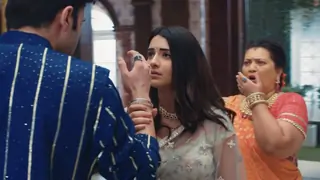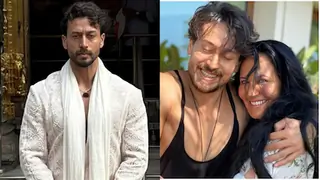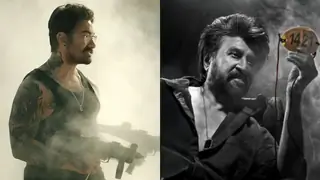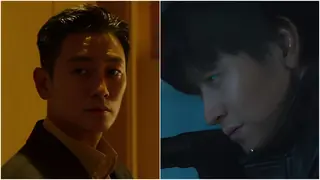On my way to the press screening for Raees, I happened to cross the Paradise theatre, an old single screen in the suburb of Mahim. Next to its dusty facade was strung up a poster of the film, Shah Rukh Khan's face looming large over much of it, Nawazuddin Siddiqui, backed up by several other cops, smaller figures in the background.
The preview that had been organised for the press couldn't have been held at a more different venue than the Paradise: we were at Le Reve right in midst of Bandra's swish Hill Road; the theatre itself goes in for a pretty Baroque decor, with crowds of roses clashing with Victorian-style gaslight fixtures all making for a fairly surreal setting. But here too, a poster of Raees had Shah Rukh Khan looking larger-than-life positioned strategically, enticing audiences within.
Shah Rukh Khan with Mahira Khan in a poster for 'Raees'
This tale of two theatres indicates what Shah Rukh Khan has attempted in Raees: he's wooing the multiplex audiences who have always been fans of his suave, urbane persona, yes; at the same time, he's also reaching out to the single screen moviegoer with his most massy' film in recent years.
And make no mistake, Raees is the quintessential commercial entertainer. It is to the credit of its director Rahul Dholakia (Parzania, Lamhaa) and its leading man Shah Rukh Khan that Raees is also so much more.
Raees is set in the Gujarat of the 1970s and 80s, when Prohibition has been in effect for well over two decades. It narrates the story of Raees Alam (Shah Rukh Khan), in whom the famed entrepreneurial spirit of the Gujaratis takes a turn that runs contrary to the letter of the law.
We start off with Raees as a young child, who serves as a runner for a bootlegger. In school, he has trouble reading the board; he is given a pair of spectacles. The glasses give him his vision back, they also give him a trigger against being referred to as "battery".
Raees is affected by one particular incident -- when he is upbraided by a policeman for warning an establishment selling illicit liquor of an impending raid, his mother steps in to save him. When the cop ridicules Raees' mother for being a ragpicker, she tells him, "Koi dhandha chhota ya bada nahi hota" a thought that impresses her son greatly. He decides that he will get into the liquor business himself, but not the cheap desi daru one -- he is going to go all hog with imported spirits. For this, he signs up to be a runner for Jayraj Seth (Atul Kulkarni) -- the first one to ever observe of Raees: "Baniye ka dimaag aur miyanbhai ki daring".
And so we see Raees grow into a young man, determined to set up his own business rather than serving as a lackey to anyone else. This is easier said than done, of course. And so the stage is set for Raees to outwit not just his contemporaries in the business, but also the law.
The law here shows up in a particularly challenging way in the person of Inspector Jaideep Majumdar (Nawazuddin Siddiqui), an honest, upright, unflappable (if eccentric) officer.
It is perhaps a sign of how vital this antagonistic but oddly respectful relationship between Raees and Majumdar is to the plot that Nawazuddin's entry scene' is filmed with as much style as Shah Rukh's himself. Not even Mahirah Khan, who plays Raees' love interest and later, wife, is given the same kind of entrance.
Watch this space for a full review.
Coming tomorrow: Anna Vetticad's review of Raees.

































301